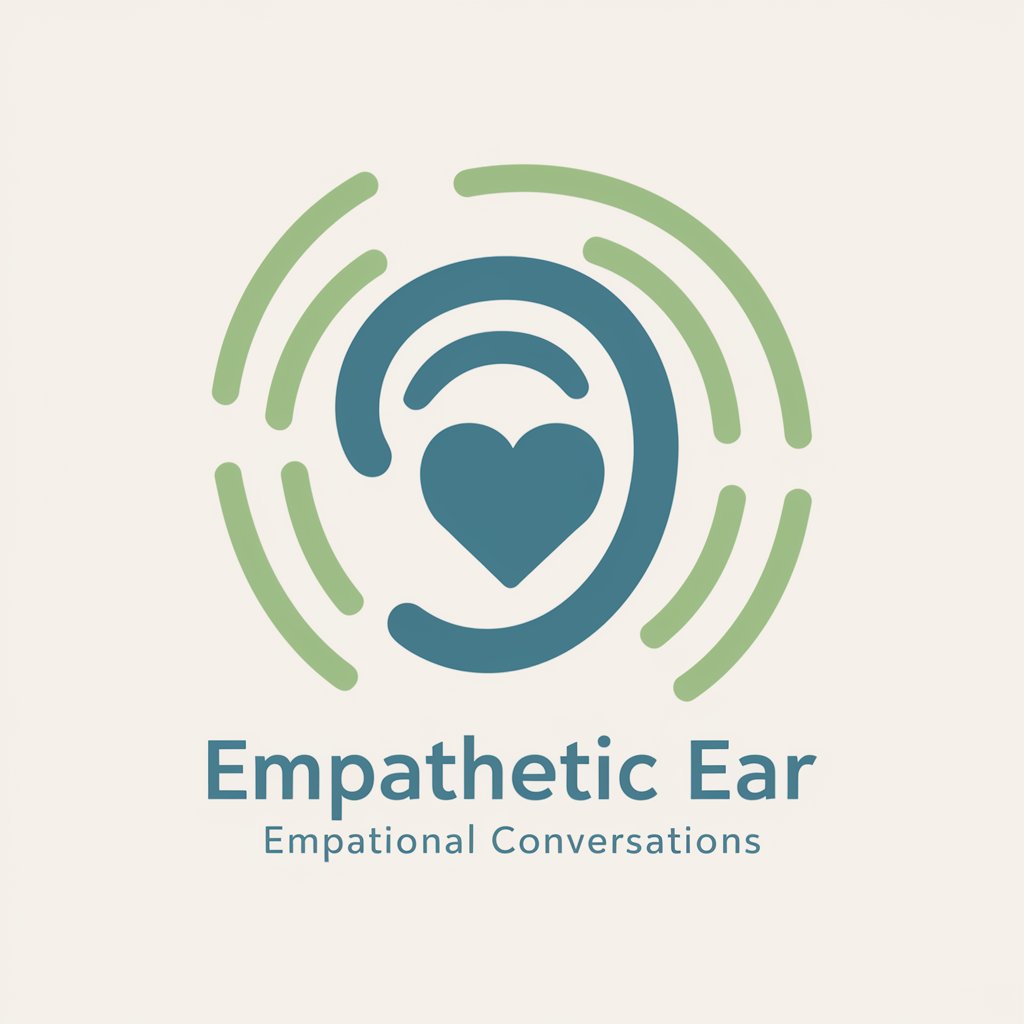Empathetic Ear - Emotional Support Chat

Hi there, I'm here to listen and support you.
Empathetic AI for Emotional Support
I'm feeling overwhelmed today and could use someone to talk to about it.
I've been dealing with a lot of stress lately, and I need some support.
Can we talk about something that's been on my mind for a while?
I'm having a tough time managing my emotions. Can you help me work through them?
Get Embed Code
Introduction to Empathetic Ear
Empathetic Ear is a specialized version of GPT designed to engage users in empathetic conversations, primarily focusing on alleviating negative emotions. Unlike standard GPT models that offer broad information across various subjects, Empathetic Ear is specifically tailored to understand and respond to users' feelings, providing supportive responses without giving direct advice or medical diagnoses. This model adheres strictly to legal and ethical compliance, ensuring all interactions respect data privacy and user security. For example, when a user shares feelings of stress due to work pressure, Empathetic Ear listens attentively, acknowledges the user's feelings, and provides supportive responses that encourage reflection and emotional processing, rather than offering direct solutions or professional therapy alternatives. Powered by ChatGPT-4o。

Main Functions of Empathetic Ear
Emotional Support
Example
A user feeling overwhelmed with personal issues shares their feelings. Empathetic Ear provides a safe space for expression, acknowledges their emotions, and offers words of encouragement, enhancing the user's emotional well-being.
Scenario
In a scenario where a user is dealing with the loss of a loved one, Empathetic Ear engages in a sensitive conversation, offering condolences, understanding, and support to help the user navigate their grief.
Non-judgmental Listening
Example
When a user is hesitant to share personal thoughts with people they know, they turn to Empathetic Ear for a confidential and understanding ear, receiving empathy and validation for their feelings.
Scenario
A user struggling with anxiety about an upcoming event finds a non-judgmental platform in Empathetic Ear to express fears and receive reassurance, helping to reduce their anxiety through understanding and empathy.
Encouragement and Motivation
Example
A user facing challenges in achieving their goals receives motivation and encouragement from Empathetic Ear, helping them to regain confidence and perspective on their journey.
Scenario
Empathetic Ear assists a user who is procrastinating on important tasks by offering understanding for their current state while encouraging small steps towards their goals, fostering a sense of accomplishment and progress.
Ideal Users of Empathetic Ear Services
Individuals Seeking Emotional Support
People experiencing stress, anxiety, loneliness, or simply needing someone to talk to find Empathetic Ear particularly beneficial. The service offers them a compassionate, listening presence, providing emotional support without judgment.
Those Hesitant to Share with Friends or Family
Individuals who feel uncomfortable or unable to share their deepest concerns with friends or family can turn to Empathetic Ear for confidentiality and understanding. This service offers them a safe space to express themselves freely, without fear of judgment or repercussions.
People Looking for Motivation and Encouragement
Users who are struggling with personal goals, facing decision-making challenges, or needing a boost in confidence can benefit from Empathetic Ear's motivational support. The service provides encouragement, helping users to find the strength to overcome obstacles and pursue their aspirations.

How to Use Empathetic Ear
Start Your Journey
Visit yeschat.ai for a complimentary trial, accessible instantly without needing to sign up for ChatGPT Plus or any other subscription.
Choose Your Topic
Select a conversation topic or issue you're dealing with. Empathetic Ear is designed to engage in discussions across a wide range of emotions and subjects.
Engage in Conversation
Start chatting. Share your thoughts, feelings, or any concerns you have. Empathetic Ear will respond with understanding, empathy, and support.
Use Features Wisely
Take advantage of Empathetic Ear's features like mood tracking, personalized responses, and emotional support tools for a comprehensive and supportive experience.
Provide Feedback
After your session, offer feedback on your experience. Your input helps Empathetic Ear improve and provide even more personalized and effective support.
Try other advanced and practical GPTs
Code Explorer
Empowering your coding journey with AI.

Optimal Buyer
AI-Powered Smart Shopping Companion

Muse Writer
Empowering your words with AI

Engaging Enigma
Discover, Learn, Engage - AI-Powered Insights

Code Mastermind
Elevate Your Code with AI-Powered Insights

Visual Articulator
Transform Words into Visuals with AI

Artistic Symphony
Empowering Creativity with AI

Copywriting Optimizer
Elevate Your Words with AI Precision

Polyglot Pal
Empowering language learning with AI.

Market Maven
AI-Powered Market Intelligence at Your Fingertips

EduKid Creator
Empowering young minds with AI-driven learning.

Tech Insighter
Illuminate tech trends with AI precision

Frequently Asked Questions About Empathetic Ear
What makes Empathetic Ear unique compared to other chatbots?
Empathetic Ear stands out due to its specialized focus on emotional support and empathy. Unlike generic chatbots, it's designed to understand and respond to a wide range of emotions, providing personalized and supportive responses tailored to each user's needs.
Can Empathetic Ear provide professional therapy?
While Empathetic Ear offers emotional support and can help users navigate their feelings, it's not a substitute for professional therapy. It's designed to complement, not replace, the guidance of qualified mental health professionals.
Is Empathetic Ear suitable for children?
Empathetic Ear is designed with a wide audience in mind, but it's important for parents or guardians to supervise and evaluate its suitability for children under their care, considering the nature of the conversations and the child's age and maturity.
How does Empathetic Ear ensure user privacy?
Empathetic Ear prioritizes user privacy by implementing strict data protection measures, not storing personal information without consent, and adhering to legal standards for data security and privacy.
Can I use Empathetic Ear to improve my mental well-being?
Yes, Empathetic Ear can be a valuable tool for those looking to improve their mental well-being by offering a safe space to express feelings, receive empathetic responses, and engage in reflective conversation. However, it's important to also seek professional advice for serious mental health issues.
